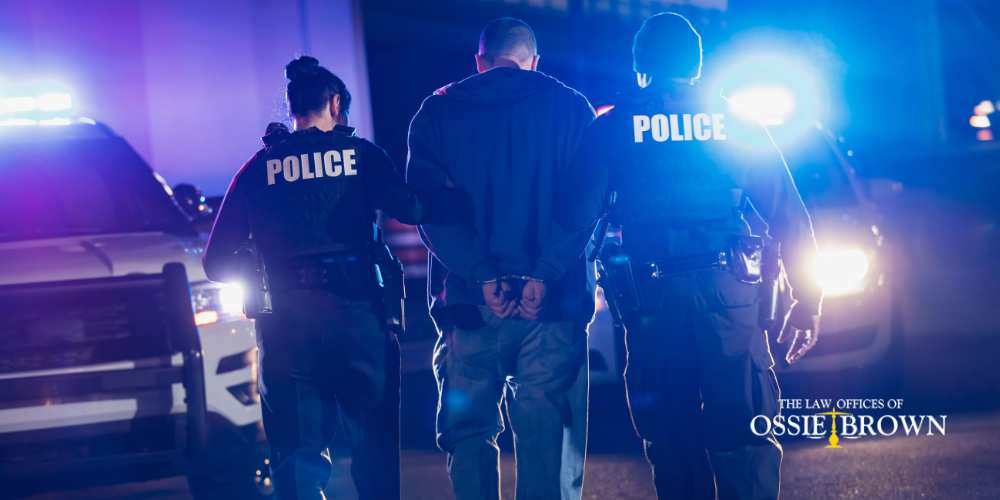‘Detainment and arrest’ are not interchangeable legal standards or legal issues. Understanding the difference between detention and arrest is vital, particularly for individuals involved in or accused of criminal conduct. Below, our experienced Baton Rouge criminal defense attorney team compares the terms detained vs. arrested, and explains all the similarities and differences you need to know should ever police detain you in Baton Rouge, Louisiana.
For anyone in Baton Rouge, LA, who finds themselves being the person detained, arrested, or convicted of a criminal matter, recognizing the stages of a criminal proceeding is crucial. In such situations, securing the best criminal defense is paramount.
Call the Law Offices of Ossie Brown at 225-343-1111 today. Our Baton Rouge criminal defense attorney team handles various criminal charges, including drug crimes, theft crimes, sex crimes, violent crimes, or white-collar crimes, and more.
What is Detention?

In criminal law, detention is a temporary situation where a police officer stops and holds a person based on reasonable suspicion of involvement in a criminal activity. This does not amount to a police arrest but is more than a casual interaction.
When an investigatory detention or detainment occurs, the person is not free to leave, but investigatory detentions are usually short-lived which allows officers to briefly investigate the circumstances. Common scenarios include a traffic stop or questioning someone near a recent crime scene.
When police detain someone, the investigatory detention is based on a specific, articulable fact leading the police officer to suspect criminal activity or criminal conduct, rather than criminal charges or finding guilt.
What’s the Purpose of Detention?
The purpose of investigatory detentions serve several functions, crucial for both law enforcement and the civil rights of individuals:
- Investigative Tool: When police detain someone, they are able to investigate a situation where there is reasonable suspicion of illegal activity. Investigatory detention provides a legal means to temporarily halt an individual in their immediate surroundings to gather more information without the necessity of full arrest procedures.
- Ensuring Public Safety: Police interactions with those under reasonable suspicion of illegal activity serves as a way to protect public safety and preserve evidence.
- Determining the Need for Arrest: Investigatory detention is often used to assess whether there is sufficient evidence or probable cause to justify an official arrest. It acts as an intermediary step, allowing law enforcement officers to decide if further legal action is necessary.
- Clarification of Situations: Sometimes, detentions can help suspects communicate effectively with police officers. Clarifying misunderstandings or misidentifications can result in the quick resolution of a situation without the need for a potential false arrest or criminal charges.
- Rights Protection: Detention can also protect the fundamental rights of individuals. By setting clear boundaries on police interactions, it ensures that law enforcement actions are justified and not arbitrary.
What is an Arrest?

An arrest occurs when a person is taken into police custody on probable cause that they are involved in criminal conduct under federal or local criminal law. This step goes beyond detention and represents a formal accusation against an arrested individual.
During an arrest, the suspect’s freedom is substantially restricted as they are transported to a police station, fingerprinted, and formally charged. Probable cause for an arrest arises from sufficient evidence or all the circumstances that would lead a reasonable person to believe that the suspect is involved in criminal activity.
Unlike detention, which is brief and based on reasonable suspicion, an arrest is a more prolonged process and marks the beginning of formal criminal charges. It triggers specific legal rights, such as a person’s Miranda Rights which include the right to remain silent and the right to have an attorney present.
What’s the Purpose of an Arrest?
The purpose of an arrest is multifaceted, playing a critical role in the criminal justice system. Primarily, it serves to:
- Initiate Legal Proceedings: This marks the formal beginning of criminal proceedings against an individual. It transitions an investigation to a legal process.
- Prevent Further Criminal Activity: By taking a suspected criminal into police custody, an arrest aims to prevent them from engaging in additional criminal activity.
- Ensure Appearance in Court: Arresting an individual ensures their presence in court for trial. It is a means to compel the accused to face the charges against them.
- Gather Evidence: The arrest process often involves searching the individual and collecting evidence. This can be crucial for building a case and supporting the charges brought against them.
- Uphold Justice: At its core, an arrest is about upholding the rule of law and ensuring that those who allegedly break the law are held accountable. It reinforces the principle that no one is above the law.
Detained vs. Arrested: What’s the Main Difference?
The distinction between being detained and being arrested is pivotal in understanding one’s rights and the legal process. While both involve interactions with law enforcement officers, they differ significantly in terms of legal implications, duration, and the rights that police don’t want you to know.

Basis of Action – The Reasonable Suspicion Standard
Detention is based on the reasonable suspicion standard. This means that a police officer has specific and articulable facts to believe that the person is in criminal activity.
Meanwhile, an arrest warrant requires probable cause. This is a higher standard than reasonable suspicion and means that there are facts or evidence that would lead a reasonable person to believe that the suspect has committed a crime.
If a case goes to trial, the prosecution would then have to prove the accused was guilty beyond a reasonable doubt.
Duration and Scope
Detention is typically brief and limited in scope. The purpose is to resolve an officer’s reasonable suspicion either by dispelling it or by gathering enough evidence for an arrest. The person detained is not free to leave during a investigatory detention but is not moved to a different location.
On the other hand, an official arrest involves taking the individual into custody, often to a police station, for a longer period. This step marks the beginning of formal legal proceedings and can lead to charges and court appearances.
Legal Rights
When a person is detained, they have the right to remain silent and do not have to consent to a pat down search. They can ask if they are free to leave, but they are not necessarily entitled to legal counsel at this stage.
When an arrest occurs, the individual is read their Miranda rights, which include the right to remain silent and the right to have an attorney appointed to them. These rights are crucial for protecting oneself against self-incrimination and ensuring legal representation.
Impact on Legal Process
If law enforcement officials briefly detain someone, it doesn’t typically result in a mark on that person’s record unless it escalates to an arrest. Meanwhile, an arrest leads to a more formal and documented interaction with the criminal justice system, including a potential criminal record.
Understanding the main differences between detention and arrest is critical, especially for individuals who find themselves in criminal investigations. Recognizing these distinctions helps in making informed decisions and protecting one’s legal rights.
For those facing either situation in Baton Rouge, seeking prompt legal advice from experienced criminal defense attorneys, such as the Law Offices of Ossie Brown, is essential to navigate these complexities effectively.
How to Tell if a Detainment Turns Into an Arrest

Determining whether a detainment has escalated into an arrest can be crucial for understanding your legal situation and rights. Here are key indicators to watch for:
- Change in Communication: If the officer informs you that you’re under arrest or reads you your Miranda rights, it’s a clear sign that you’ve been arrested. These rights include informing you of the right to remain silent and the right to an attorney.
- Physical Restraint: The use of handcuffs or moving you to a police vehicle or station typically signifies an arrest. While you may be briefly restrained during a detention for safety reasons, prolonged or more restrictive restraints usually indicate an arrest.
- Duration and Location: Investigatory detentions are meant to be brief and occur at the place of stop. If an officer prolongs the interaction for an extended period or you’re transported to another location, such as a police station, it likely means you’ve been arrested.
- Nature of Questioning: During a detention, questions are generally aimed at clarifying your involvement in a suspected crime. If questioning becomes more in-depth, or if you’re asked to provide statements at a police station, it’s likely an arrest.
- Intimation of Charges: Officers may explicitly state the charges or the crime they believe you’ve committed. This is a strong indication of an arrest, as formal charges are typically not discussed during a detention.
Being aware of these signs can help you understand your situation and ensure you exercise your rights appropriately. If you believe your detainment has turned into an arrest, it’s crucial to exercise your right to remain silent and request an attorney, especially in complex legal scenarios like those in Baton Rouge. Remember, reaching out to experienced defense attorneys, such as those at the Law Offices of Ossie Brown, can provide you with the necessary guidance and representation.
Your Rights During a Detainment or Arrest
Understanding your fundamental rights during a detainment or arrest is crucial to protecting yourself within the legal system, and these rights are primarily rooted in the Fourth Amendment, which guards against unreasonable searches and seizures. Here are key rights to be aware of:
Right to Remain Silent
Both during detainment and arrest, you have the right to remain silent. You are not obligated to answer questions beyond basic identification information. It’s often advisable to exercise this right until you have legal counsel.
Right to Refuse Consent to Search
In a detainment scenario, you have the right to refuse consent to a search of your person or belongings. However, note that if an officer has reasonable suspicion, they may pat down your outer clothing for weapons.
Right to an Attorney
Upon arrest, you have the right to an attorney. This is one of your Miranda rights, which should be read to you at the time of the arrest. If you cannot afford an attorney, one will be provided for you.
Protection Against Unreasonable Search and Seizure From Law Enforcement Officers
Under the Fourth Amendment, you are protected against unreasonable searches and seizures. This means that a law enforcement officer needs probable cause or a search warrant to conduct a thorough search or to arrest you.
Right to Know the Reason for Arrest From a Police Officer
When arrested, you have the right to be informed of the charges against you. This helps you understand the nature of the allegations and prepare your defense accordingly.
Right to a Phone Call
Generally, after being arrested, you are entitled to make a phone call. This can be used to contact a family member, friend, or an attorney.
Understanding these rights is vital, especially in situations where you might feel vulnerable or uncertain. If you find yourself detained or arrested in Baton Rouge, it’s imperative to exercise these rights and contact experienced criminal defense attorneys like those at the Law Offices of Ossie Brown to ensure your rights are fully protected.
Baton Rouge Criminal Defense Attorneys
If you’re facing legal issues in Baton Rouge, whether it’s due to detainment, arrest, or criminal charges, it’s essential to have skilled and experienced legal representation. The Law Offices of Ossie Brown, renowned for our decades of combined criminal defense experience, are here to provide the support and guidance you need. Our team understands the complexities of the legal system and is committed to advocating for your rights and best interests. We specialize in a range of criminal cases, including drug offenses, theft, sex crimes, violent crimes, white-collar crimes and more. By choosing the Law Offices of Ossie Brown, you’re ensuring that your case is handled with the utmost professionalism and dedication.
Don’t navigate the legal waters alone; call us today at 225-343-1111 for a free consultation, and let an experienced criminal defense attorney stand by your side during this critical time.


